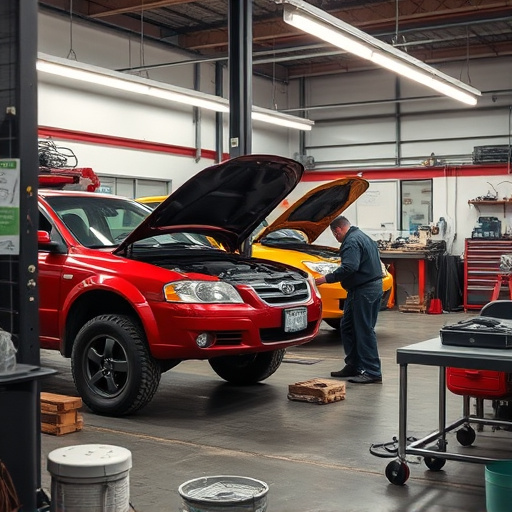EPA compliant body shops enforce strict waste management and environmental protection regulations to safeguard communities and the environment. Compliance requires efficient wastewater systems, responsible solid waste handling, emission control for painting and sanding, recycling, and staff training. Embracing digital technology streamlines operations, enhances efficiency, ensures adherence to EPA guidelines, optimizes productivity, reduces errors, minimizes waste, and contributes to profitability while maintaining a responsible reputation.
In today’s regulated environment, ensuring an EPA compliant body shop is paramount. This article explores how technology acts as a catalyst for efficiency within these operations. We delve into understanding stringent EPA regulations specific to body shops and highlight digital tools that streamline compliance. Furthermore, it examines strategies to optimize processes, maximizing productivity and profitability while adhering to environmental standards, ultimately transforming body shops into models of both ecological responsibility and operational excellence.
- Understanding EPA Regulations for Body Shops
- Implementing Digital Tools for Efficient Compliance
- Streamlining Processes: Maximizing Shop Productivity and Profitability
Understanding EPA Regulations for Body Shops

The Environmental Protection Agency (EPA) sets strict standards for body shops to ensure responsible waste management and minimal environmental impact during vehicle body repair and tire services. These regulations are designed to protect both the local community and the broader environment from hazardous substances released during the auto body restoration process. Body shops must be EPA compliant, adhering to guidelines that cover a wide range of activities, including proper disposal of fluids, handling of solid waste, and controlling emissions from painting and sanding operations.
Compliance involves implementing efficient systems for managing and treating wastewater, capturing and recycling materials where possible, and training staff on the best practices for minimizing pollution. By staying up-to-date with EPA guidelines and adopting innovative technologies, body shops can streamline their processes, enhance efficiency in vehicle dent repair, and ensure they meet all necessary standards without compromising quality or safety during operations like tire services.
Implementing Digital Tools for Efficient Compliance

In today’s digital era, implementing cutting-edge technology is no longer an option but a necessity for any forward-thinking auto body shop aiming to be EPA compliant. By embracing digital tools, an auto repair shop can streamline its operations and ensure adherence to environmental regulations. These tools include specialized software designed to manage and track the use of hazardous materials, as well as systems that automate reporting processes, reducing manual errors and saving time.
For example, digital inventory management systems can help vehicle repair services keep a precise record of all chemicals and substances used in their operations, facilitating easy tracking and disposal according to EPA guidelines. Additionally, these technologies enable real-time data analysis, allowing shop managers to identify inefficiencies and make informed decisions to enhance overall efficiency without compromising compliance standards.
Streamlining Processes: Maximizing Shop Productivity and Profitability

In the realm of EPA compliant body shops, technology acts as a powerful catalyst for enhancing efficiency and profitability. By streamlining processes, advanced software solutions enable collision repair centers and auto body repair facilities to optimize their operations. For instance, digital mapping and 3D imaging technologies can accurately assess vehicle damage, reducing manual inspection time and potential human errors. This precision leads to faster turnaround times, allowing car repair shops to maximize productivity and meet increasing customer demands efficiently.
Moreover, technology integration offers real-time data analysis capabilities, which help manage inventory levels, predict parts requirements, and minimize waste. These digital tools not only contribute to sustainable practices but also ensure that EPA standards are met consistently. As a result, body shops can achieve higher profitability while maintaining their reputation as efficient, responsible, and EPA compliant facilities.
Technology plays a pivotal role in transforming traditional body shops into modern, efficient, and EPA compliant operations. By implementing digital tools and streamlining processes, body shop owners can maximize productivity, boost profitability, and ensure adherence to strict environmental regulations. This digital revolution not only benefits businesses but also contributes to a greener and more sustainable automotive industry.














